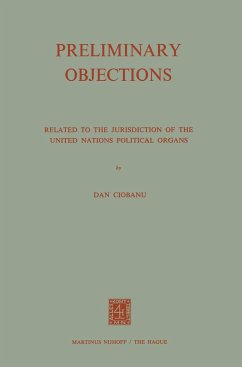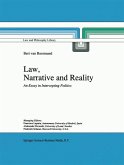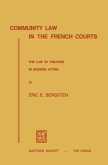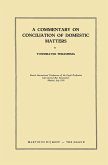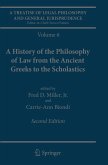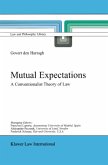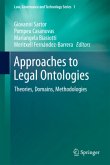I Jurisdiction.- I: Political Jurisdiction.- Section I: Jurisdiction of the Principal Organs of The United Nations.- 1. The United Nations as summa of its organs.- 2. The eminently political character of the United Nations.- 3. Composition of the United Nations organs.- 4. Interests pursued by States.- 5. Expediency characterizing the jurisdiction of the United Nations political organs.- 6. Legality and expediency in the activities of the United Nations political organs.- 7. The public policy character of the jurisdiction possessed by the United Nations political organs.- Section 2: Jurisdiction of the Subsidiary Organs of the United Nations.- 8. Concept of ¿subsidiary organ¿.- 9. Relationship between the principal organ and its subsidiary.- 2: Distribution and Concurrence of Jurisdictions in International Law.- Section I: Distribution Of Jurisdictions.- 10. Fundamental function of contemporary international law.- 11. Definition of jurisdiction of the United Nations qua international person.- 12. Delimitation of jurisdiction of the United Nations from the ¿reserved domain¿ of member States.- 13. Separation of jurisdiction among the organs of the United Nations.- Section 2: Concurrent Jurisdiction.- 14. Negative and positive conflicts of jurisdiction.- 15. Concurrent jurisdiction between the United Nations taken as a whole and States.- 16. Concurrent jurisdiction between the United Nations and other international bodies.- 17. Concurrent jurisdiction between the United Nations political organs and the International Court of Justice.- 18. Concurrent jurisdiction between the political organs of the United Nations.- II Preliminary Objections.- 3: Categories of Preliminary Objections and their Legal Foundation.- Section 1: Concept, Function and Categories of Preliminary Objections.- 19. Preliminary objections to jurisdiction and arguments on the merits.- 20. Preliminary objections to the jurisdiction of organs and to the admissibility of the complaint.- Section 2: Legal Foundation Of Preliminary Objections.- 21. Legal doctrines as a source of the law of the United Nations.- 22. Character of the legal doctrines related to the jurisdiction of the United Nations political organs.- 4: Objection Ultra Vires.- Section 1: Doctrine of Ultra Vires.- 23. Source of jurisdiction.- 24. Principle of speciality.- 25. Definition of powers.- Section 2: Objection Ultra Vires.- 26. Concept and legal basis of the objection.- 27. Difficulties in raising the objection.- 28. Legal nature and effects of the objection.- 5: Objection Conditio Sine Qua Non.- Section I: Doctrine of Conditio Sine Qua Non.- 29. Conditio sine qua non in general international law.- 30. Conditio sine qua non in the law of the United Nations.- 31. Nature of the ¿priority clause¿ contained in Article 33, paragraph 1, of the Charter.- Section 2: Objection Conditio Sine Qua Non.- 32. Character and effects of the objection.- 6: Objection Electa Una Via.- Section I: Doctrine of Electa Una Via.- 33. Electa una via in general international law.- 34. Doctrine of electa una via in the law of the United Nations.- Section 2: Objection Electa Una Via.- 35. Function of the objection.- 36. Objection electa una via based on Article 52, paragraph 2, of the Charter.- 7: Objection Lis Pendens.- Section I: Doctrine of Lis Pendens.- 37. General considerations.- 38. Characteristics of the doctrine of litispendence in inter-State relations.- Section 2: Doctrine of Litispendence in the Law of the United Nations.- 39. Introductory remark.- 40. ¿Political¿ litispendence provided for in Article 12, paragraph 1, of the Charter.- 41 ¿Special¿ litispendence provided for in Article 36, paragraph 2, of the Charter.- Section 3: Objection Lis Pendens.- 42. Concept, legal nature, and effects of the objection.- 43. Comparison of the objection lis pendens with the objections electa una via and res judicata.- 8: Objection Res Judicata.- Section I: Doctrine of Res Judicata.- 44. Concept and conditions of res judicata.- 45. Characteristics of the doctrine in the law of the United Nations.- Section 2: Objection Res Judicata.- 46. Objection res judicata in the law of the United Nations.- 47. Categories of res judicata.- 48. Rule non ultra petita.- III Final Determination.- 9: Determination of the Validity of Preliminary Objections.- Section I: Judicial Determination.- 49. Final determination of the validity of the objections.- 50. Judicial determination at the request of member States.- 51. Advisory jurisdiction of the International Court of Justice.- Section 2: Political Determination.- 52. Recourse to ad hoc committees of jurists or joint conferences.- 53. Determination made by the political organ in which the objections have been raised (the theory of ¿la comp¿nce de la comp¿nce¿).- 54. Determination made by States (the right of last resort).- 10: Procedural Questions Related to Preliminary Objections.- Section I: Raising the Objections.- 55. Subjects entitled to raise the objections.- 56. Legal means and procedures by which the objections can be raised.- 57. Time for raising the objections.- 58. Burden of proof.- Section 2: Decisions On Objections.- 59. Questions of priority of decisions on preliminary objections and reservation of jurisdiction.- 60. Judicial redress.- Table of cases.- Index of subjects.- Index of countries and other territories.- Index of names.- Articles.- Resolutions.- Commissions and committees.- Reports.
Hinweis: Dieser Artikel kann nur an eine deutsche Lieferadresse ausgeliefert werden.
Hinweis: Dieser Artikel kann nur an eine deutsche Lieferadresse ausgeliefert werden.

